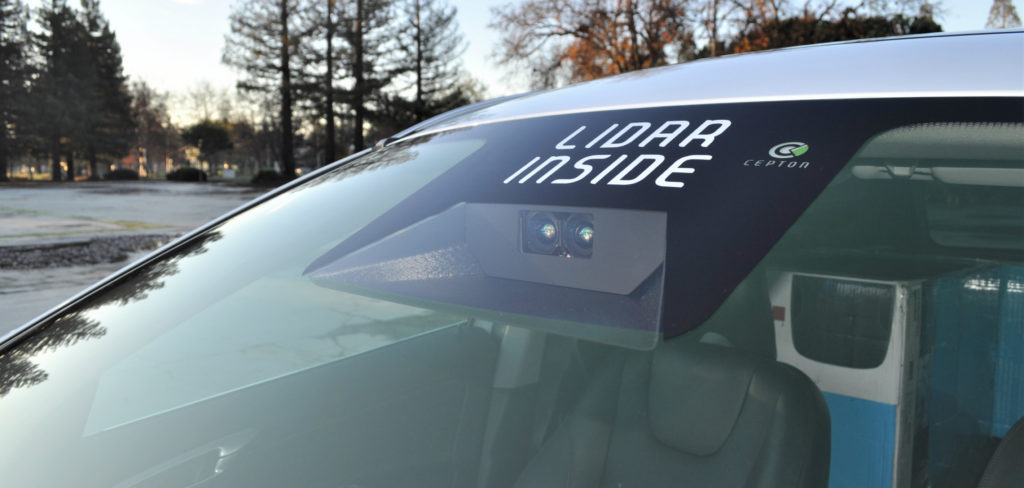Dr Jun Pei, CEO and co-founder of Cepton, presents the argument for adoption of mass-market lidar systems
Lidar is a superior sensing technology that is enabling vehicle manufacturers to set a higher bar for automotive safety. Yet, due to some common misconceptions, lidar sometimes gets left out of the conversation about the future of automobiles.
One line of thought is that lidar might be too expensive. This confuses the high costs of 360° view lidars with the much more inexpensive directional lidars that are increasingly used in mass-market applications such as automobiles. Automotive lidars sell for just a few hundred dollars. Another concern is whether lidars are reliable enough for automotive applications. This has also been addressed, as major automotive Tier 1s have entered the lidar market, sometimes by licensing state-of-the-art designs from innovative partners.
Lidar is fast, accurate in three dimensions (3D) and works at long distance, making it an ideal solution to form the ‘eyes’ of semi-autonomous, advanced driver assistance systems and fully autonomous or self-driving vehicles. It is therefore poised to be the cornerstone of the next generation of automotive safety. With rising road safety concerns, the importance of lidar in achieving vehicle safety goals over the next decade cannot be overstated. No wonder that many analysts forecast the automotive lidar market to be worth billions.
The reason lidar is becoming indispensable is that it has many significant advantages over camera and radar, which are used in ADAS today. While camera and radar have helped increase road safety, they have limitations that prevent them eliminating the majority of traffic accidents and fatalities.
Automotive radars detect the speed and distance of other objects in relation to the driving vehicle. However, the resolution achievable with radar is poor, and detectability is not always accurate. Radar returns tend to have high false positives, meaning they detect objects that don’t actually exist. In addition, radars are subject to false negatives, which means they miss objects that do exist, especially if they are stationary. For ADAS vehicles, this is a crucial weakness that could result in unexpected braking or avoidable crashes.
Lidar, on the other hand, scans the path ahead by sending out thousands of invisible pulses of light every fraction of a second. These pulses collide with surrounding objects and reflect back to the sensor. This data is used to create a highly accurate 3D image called a ‘point cloud’, which provides the vehicle’s onboard computer with a constant awareness of what is happening around it, so it can react accordingly. Lidars can thus build high-resolution, long-range, accurate 3D images of the vehicle’s surroundings every fraction of a second, overcoming some of radar’s key weaknesses.
Camera-based vision systems meanwhile have high resolution, but face detectability challenges as well. The glare of direct sunlight or low sun position can make it difficult for cameras to properly view the surroundings and detect objects or lane lines. In darkness, cameras can also miss objects, especially ones in the distance, smaller objects or those that are dark in color. Objects in shadows are typically difficult to detect with vision systems as the blending of colors of objects with the background could lead to improper detections or false negatives.
Curvy roads and hilly terrain pose problems for the camera to detect lane lines or road edges correctly. Under difficult outdoor conditions, such as rain and fog, cameras get more easily occluded. Any of these situations can lead to loss of ADAS functionality and therefore accidents.
Lidar systems can avoid these problems because the lidar doesn’t require external or additional light illumination to detect objects. With lidars, people, vehicles and objects at distances up to and over 200m (650ft) away can be seamlessly detected under conditions of direct sun, darkness, shadows and more. Lidars also perform better than cameras in challenging ambient conditions such as rain and snow.
The technological reasons why lidar is poised to play a huge role in the future of the automotive industry are very clear. It is important for lidar companies to develop partnerships with Tier 1 automotive manufacturers for high-volume manufacturing and continue to innovate to make their products as compact and power-efficient as possible. Of late, lidar suppliers and Tier 1s have been leading the way in this respect. Ultimately, as lidars become more commonplace and smaller, we expect adoption to become even easier.
 Dr Jun Pei is a technologist in optics and electronics and is CEO and co-founder of Cepton, which develops and supplies lidar solutions to a variety of markets. Before co-founding Cepton, Pei founded AEP Technology to develop advanced 3D optical instruments. Earlier in his career, he led engineering efforts at Velodyne and worked in technology development at KLA-Tencor. Dr Pei received his PhD in electrical engineering from Stanford University
Dr Jun Pei is a technologist in optics and electronics and is CEO and co-founder of Cepton, which develops and supplies lidar solutions to a variety of markets. Before co-founding Cepton, Pei founded AEP Technology to develop advanced 3D optical instruments. Earlier in his career, he led engineering efforts at Velodyne and worked in technology development at KLA-Tencor. Dr Pei received his PhD in electrical engineering from Stanford University


